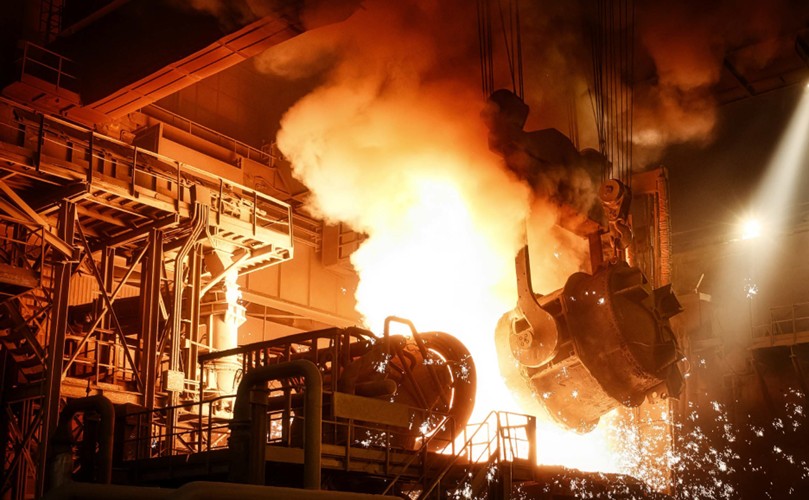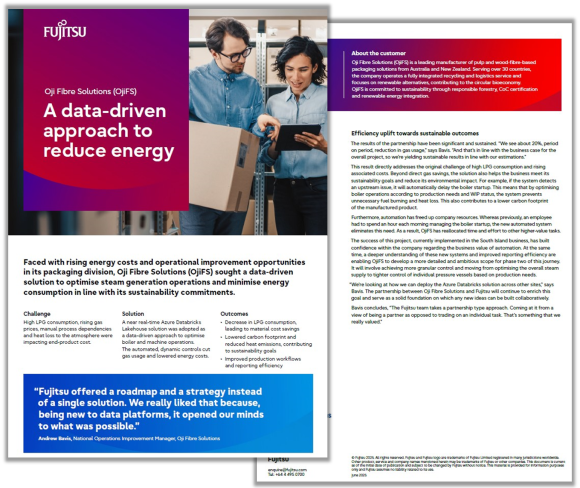Oji Fibre Solutions
A data-driven
approach to
reduce energy

Faced with rising energy costs and operational improvement opportunities in its packaging division, Oji Fibre Solutions (OjiFS) sought a data-driven solution to optimise steam generation operations and minimise energy consumption in line with its sustainability commitments.
Challenges
High LPG consumption, rising gas
prices, manual process dependencies
and heat loss to the atmosphere were
impacting end-product cost.
Solutions
A near real-time Azure Databricks
Lakehouse solution was adopted as
a data-driven approach to optimise
boiler and machine operations.
The automated, dynamic controls cut
gas usage and lowered energy costs.
Outcomes
-
Decrease in LPG consumption,
leading to material cost savings -
Lowered carbon footprint and
reduced heat emissions, contributing
to sustainability goals
-
Improved production workflows
and reporting efficiency
“Fujitsu offered a roadmap and a strategy instead of a single solution. We really liked that because,
being new to data platforms, it opened our minds to what was possible."
Andrew Bavis, National Operations Improvement Manager, Oji Fibre Solutions
About the customer
Oji Fibre Solutions (OjiFS) is a leading manufacturer of pulp and wood-fibre-based
packaging solutions from Australia and New Zealand. Serving over 30 countries,
the company operates a fully integrated recycling and logistics service and
focuses on renewable alternatives, contributing to the circular bioeconomy.
OjiFS is committed to sustainability through responsible forestry, CoC certification and renewable energy integration.
As a leading manufacturer in the pulp and packaging industry, Oji Fibre Solutions (OjiFS) has a strong focus on sustainability and advancing the circular bioeconomy. This dedication is particularly visible in the company’s Packaging division in New Zealand, where a key part of the manufacturing process involves using steam energy in the conversion of paper into cardboard. The steam is generated by an LPG-fuelled boiler, making LPG a significant operational cost to the business.
However, the business faced material and escalating gas prices. While the physical production plant was modern and responsive to changes in demand and product mix, the boiler and steam system still required manual operation. This disparity led to inefficiencies whereby the steam system wasn’t operating in the most optimal way. For example, if an engineer was unavailable, the boiler could continue generating steam and emitting heat to the atmosphere even after production had finished. This resulted in wasted energy and heat loss, with unnecessary associated energy cost.
“We had two main challenges,” says Andrew Bavis, National Operations Improvement Manager for Packaging, New Zealand Division at Oji Fibre Solutions. “Achieving better cost efficiency and environmental sustainability improvements are a big focus for us.” In essence, the business needed a data-driven solution to enhance efficiency, reduce waste and optimise energy consumption. Fujitsu was the perfect partner to make that happen.
Forging a strategic partnership on a data platform
To provide OjiFS with the largest impact on its operations, Fujitsu proposed building a platform that could enable different phases of automation over time. “Instead of trying to sell us an individual solution for an individual problem, they were able to work with us on a strategic future and build a platform that enabled us to deliver different phases of the same project or automation over time,” comments Bavis. “So it was like a roadmap and a strategy instead of a single solution. And we really liked that because, being new to data platforms, it opened our minds to what was possible.”
This strategic approach—coupled with Fujitsu investing significant time to understand the company’s operational processes—was highly valued and led to a 12-week implementation of an Azure Databricks Lakehouse solution. This was further strengthened by weekly testing to validate system performance and integration with existing infrastructure.
Adapting to new technology requires support, the Fujitsu team was always on hand to offer help and provide learning opportunities. “There were always multiple follow-ups to make sure that we were OK,” says Bavis. “And they were there if we needed a little more time, an additional resource or a bit of something extra just to help get us across the line. We could tailor that support to where we needed it.”
The new solution, training and change management strategy worked together to transform OjiFS’s efficiency improvement efforts. The platform integrates daily production schedules from the company’s scheduling system, Kiwiplan, as well as calendar information from the manufacturing execution system (MES) and current work in progress (WIP) data.
Integrating data acquisition via Microsoft Azure IoT means that operations can now incorporate real-time data from production plant sensors. This enables automated decision-making and optimising boiler start/stop times as well as dynamic steam pressure control based on predicted demand and real-time conditions.
Efficiency uplift towards sustainable outcomes
The results of the partnership have been significant and sustained. “We see about 20%, period on period, reduction in gas usage,” says Bavis. “And that’s in line with the business case for the overall project, so we’re yielding sustainable results in line with our estimations.”
This result directly addresses the original challenge of high LPG consumption and rising associated costs. Beyond direct gas savings, the solution also helps the business meet its sustainability goals and reduce its environmental impact. For example, if the system detects an upstream issue, it will automatically delay the boiler startup. This means that by optimising boiler operations according to production needs and WIP status, the system prevents unnecessary fuel burning and heat loss. This also contributes to a lower carbon footprint of the manufactured product.
Furthermore, automation has freed up company resources. Whereas previously, an employee had to spend an hour each morning managing the boiler startup, the new automated system eliminates this need. As a result, OjiFS has reallocated time and effort to other higher-value tasks.
The success of this project, currently implemented in the South Island business, has built confidence within the company regarding the business value of automation. At the same time, a deeper understanding of these new systems and improved reporting efficiency are enabling OjiFS to develop a more detailed and ambitious scope for phase two of this journey. It will involve achieving more granular control and moving from optimising the overall steam supply to tighter control of individual pressure vessels based on production needs.
“We’re looking at how we can deploy the Azure Databricks solution across other sites,” says Bavis. The partnership between Oji Fibre Solutions and Fujitsu will continue to enrich this goal and serve as a solid foundation on which any new ideas can be built collaboratively.
Bavis concludes, “The Fujitsu team takes a partnership type approach. Coming at it from a view of being a partner as opposed to trading on an individual task. That’s something that we really valued.
Related Customer stories





